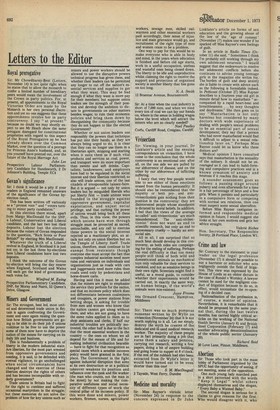Miners and Government
Sir: The strongest, best led, most united and determined trade union in Britain is again confronting the Government and once again raising the question how British governments are going to be able to do their job if unions continue to be free to use the power some of them now have to deprive the nation of the means for carrying on its daily life and business.
This is fundamentally a problem of liberty in the modern industrial state. Are liberties, for the most part wrested from oppressive governments and needing, it is said, to be defended with eternal vigilance, to go unchallenged when social circumstances have changed and the exercise of these liberties destroys the rights of others and has become incompatible with orderly government?
Trade unions in Britain had to fight' for the right to combine and suffered occasional martyrdom in the struggle; but these memories do not solve the problem of how far key unions such as miners and power workers should be allowed to use the disruptive powers technical progress has given them, and whether their leaders can be permitted any longer to cut off the nation's essential services and supplies to get what they want. This may be bad enough if what they want is more pay for their members; but suppose union leaders see the strength of their position and develop the ambition to dictate to governments on other matters besides wages; to ruin their economic policies and bring them down by disorganising the community because they do not happen to like the elected Government?
Whether or not union leaders use responsibly the powers that technique has put into their hands, as they are always being urged to do, it is clear that they can no longer use them in a libertarian spirit, stopping and starting when it suits them as if such vital products and services as coal, power, and transport were no more important than sweets and soft drinks. Capitalists, landowners, and employers have had to be regulated in the social interest and their liberties restricted; so also will trade unions, one of the last citadels of irresponsible laissez-faire. But it is argued — not only by union leaders but by misguided liberals who put liberty first — trade unions were founded in the struggle against oppressive government, capitalist exploitation, and unjust social privilege, and that curbing the power of unions would bring back all these evils. Thus, in this view, the powers which unions have won through struggle must be protected as sacred, untouchable, and any call to exercise these powers in the social interest rejected as a reactionary plot, an attack not only on union liberties but on the Temple of Liberty itself. Trade unions, therefore, must continue to be exempt from restraints though everyone else must accept the fact that complex industrial societies need more rules and restraints on individuals and organisations just as roads with cars and juggernauts need more rules than roads used only by pedestrians and horse-drawn carts.
Having said this it must be added that the miners are right to emphasise the service they perform for the nation, and that an incomes policy which does not differentiate between coalminers1 and croupiers, or power stations from betting shops, is asking for trouble' from men and women who know that the nation cannot get along without them, and who are not going to have the same rules applied to them as to shop assistants and clerks. If half our industrial troubles are politically motivated, the other half is due to the fact that the most essential workers in the country — the ones on whom we all depend for the means of life and for making industrial civilisation bearable — have to fight for that recognition as special cases which a sensible incomes policy would have granted in the first place. The Government in the fight against industrial disruption that aims at its own destruction or at a political takeover weakens its position and influence over the rank and file worker (the man who counts, not the man in the street) by not making the comparative usefulness and social necessity of different types of work the central pillar of its incomes policy. If this were done and miners, power workers, firemen, nurses, agricultural workers, sewage men, skilled railwaymen and other essential workers paid accordingly, their sense of injustice and main grievance would go, and recruitment of the right type of men and women cease to be a problem.
One way to pay for this would be to make everyone who is able in body and mind, in the years when education is finished and before old age starts, work in a useful occupation, useless and wasteful ones being closed down. The liberty to be idle and unproductive whilst claiming the right to receive the support and protection of organised society is another liberty that has gone on too long.
N. A. Smith 12 Braemar Avenue, Bournemouth
Sir: At a time when the coal industry is short of 7,000 men, and when we need every ton of coal we can lay our hands on, where is the sense in holding wages below the level which will attract the miners who are so clearly needed?
Noel Paulley Corfu, Cardiff Road, Creigiau, Cardiff.










































 Previous page
Previous page